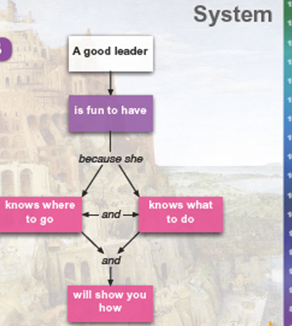The ninth of september, I started with this subject in my new educational stage. Development Psychology was the first subject, that I had. During many days, we are talking about the concept of development. Each classmate said his opinion about this term with drawings and practical exercises individually or in groups. Of this concept, step by step, others terms were arising as: lineal, cyclic, spiral, continuous, discontinuous. So, different kins of inference the context this concept was influenced through, deductions, inductions (lived experiences) and abductions (hypothesis, guess, other' experiences).
This concepts give others concepts. But, Which does relation have with my future job like a teacher the primary education? Is a subjective term , then, How can I put in practice something that not depend on me? Something that can't I control? Why do I learn something that I don't know if is correct or incorrect, as, depend on context and person. Still, I don't get to know.
The second module talk about attachment, When I studied Childhood Education, I learn the different milestones, according to age of child and how each type of attachment is going to influence in the adult life. I studied theory and theory, but when I was doing my practice in the Childhood School, the first that my educator tutor said me was "each child is different because each child has a maturation process". With this, I knew that the most important is learn how each individually children are. That is the key to be a good teacher.
I read the text "Soñar Despierta", and its words are where is the focus to be the best teacher. When I have finished to read, I remember somethings that we have done in class of Development Psychology, for example, in this class teacher try create a friendly atmosphere, funny, with plays, to create good relationship working in groups; teacher try that we think by ourselves, for that, sometimes he makes activities and explain different concepts that, the naked eye, they seem don't have a bearing on the principal concept but next you start thinking about it, and you join several concepts, ideas exposed and after much deliberation you find meaning.
Now, I want to write the different things that I like of this text: "Soñar despierta". The best teacher:
- You close your eyes and you imagine everything what you want, and you can do it with your open eyes, too.
- They are lovers illusions and they are going to spin stories.
- To be teacher: to be alert, dream and to be "craftsman", someone with feeling, knowledge, giving and receiving, treading the earth and flying and she is able to make a friendly school.
- Relationship between teacher and pupil: Warm, fun, surprise, play, work, relationships, stories, dream together. As a result, for understanding of what is being taught.
- Good humor, healthy environment, which is achieved confidence and security.
-Teacher hobbies mobilize the interest of children, it is their role model. An example appears in the text, the teacher does children interested by making them participate paired reading and sayings. She personalizes each poem with each child's name. This educator ensures that the child is part of that literature that gradually takes you to read the child to great writers of the Generation of 27. They are protagonists of theirs poems and students identify with the protagonists.
- Attachment: achieve a link safe and sturdy to strengthen the road in the adventure of teaching and learning.
To acquire attachment between teacher and student has to be:individualized treatment and workgroups (what happen, what thinking, what feeling, agree rules, acquire values).
- The teacher makes groups, but she isn't part of the group. She shows safety, control, wisdom, correction of behavior, enjoy.
When exist safety in the group, the child acquire independent, with this, the pupil develops creativity, is more critical, conflict resolution, the group is lived.
Plan a classroom:
- To know individually child and how the groups work.
- Flexibility in the classroom: the spontaneity of the teacher becomes more human. She takes into account the opinion of the pupil.
Resources:
- Imagination: Use fantasy to create reality. That actually takes part of us.
- Memories and experiences: The teacher relates her experiences as a child and today, with the experiences of pupils. With this, teacher gets in the child trust and avoides shame to tell their experiences and that all have the same importance.
- Tell stories: tales teach children values and behavior, that they may be carried into practice.
- Play: free play. It is necessary, children feel better, get initiative, help in the relationship.
- Theatre encourages to the reading, to meet characters, theirs stories.
- To catch naturals things that child can transformer and to be part of the environment.
- To tell in classroom events of every day.
I think that this things are important in the life of a student. With this type of education the student acquire attachment in any stage of his life in childhood school, primary, school, secondary school, high school, University, F.P.,…
Everyone needs"The link or emotional bond that develops between two people as a result of interaction and leads them to maintain proximity and contact in achieving safety, comfort, and protection" in the life".
_16_09_14.jpg)


_16_09_14.jpgSAK.jpg)
_16_09_14.jpg)








